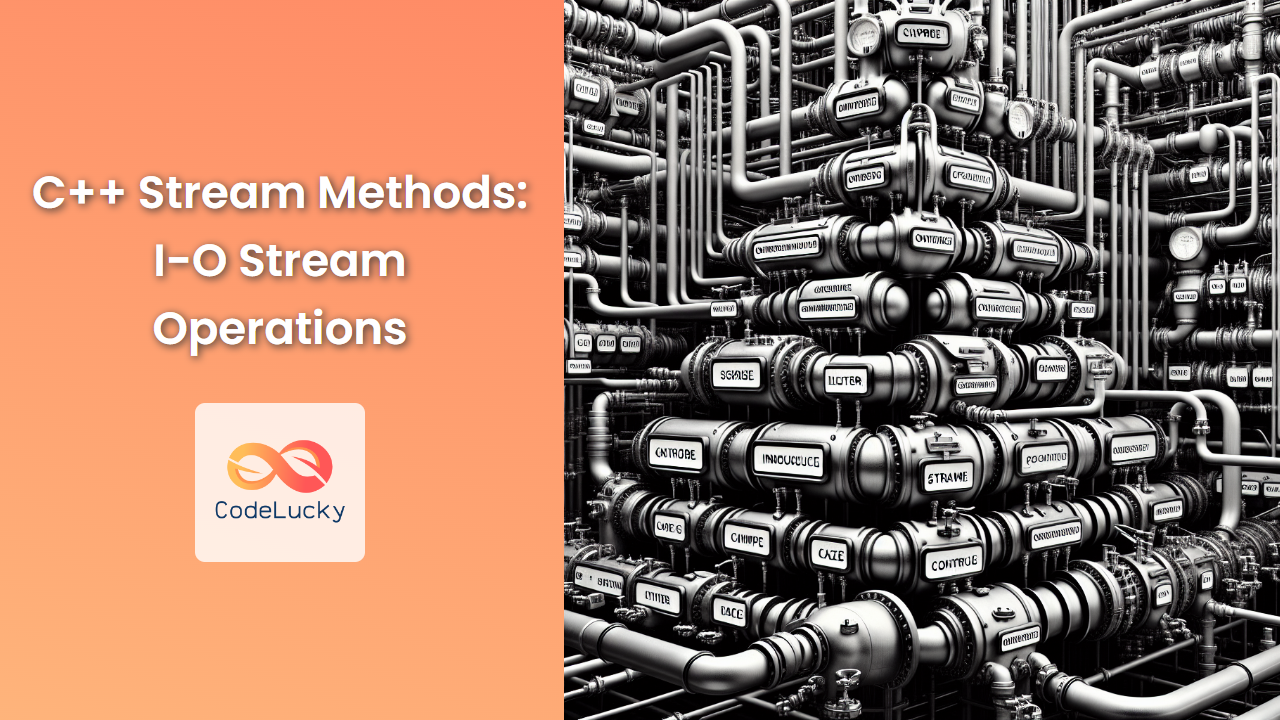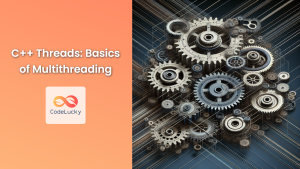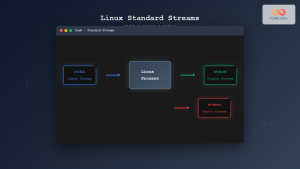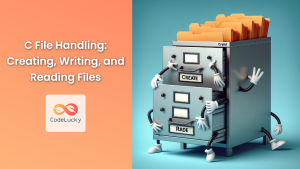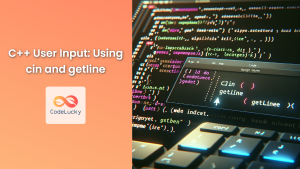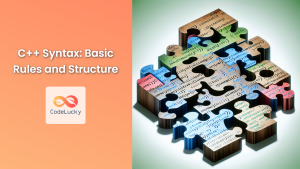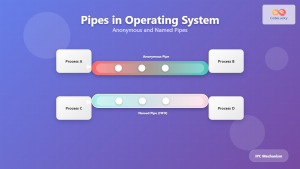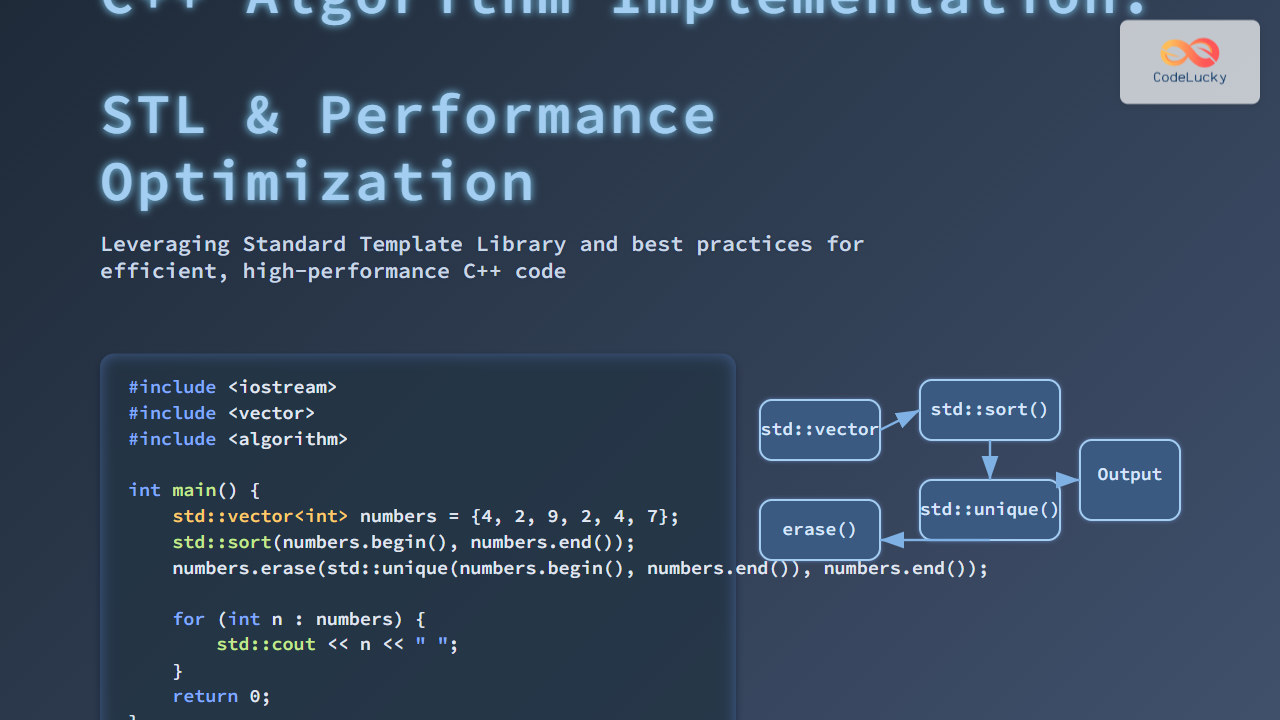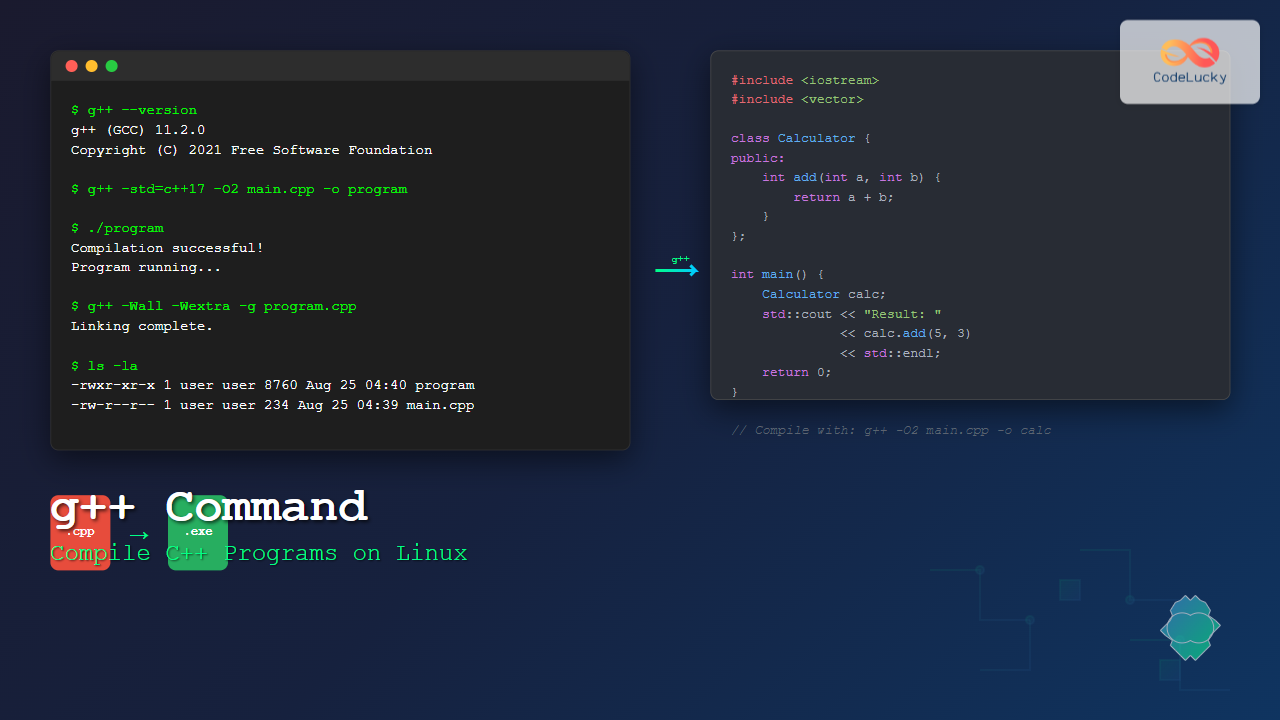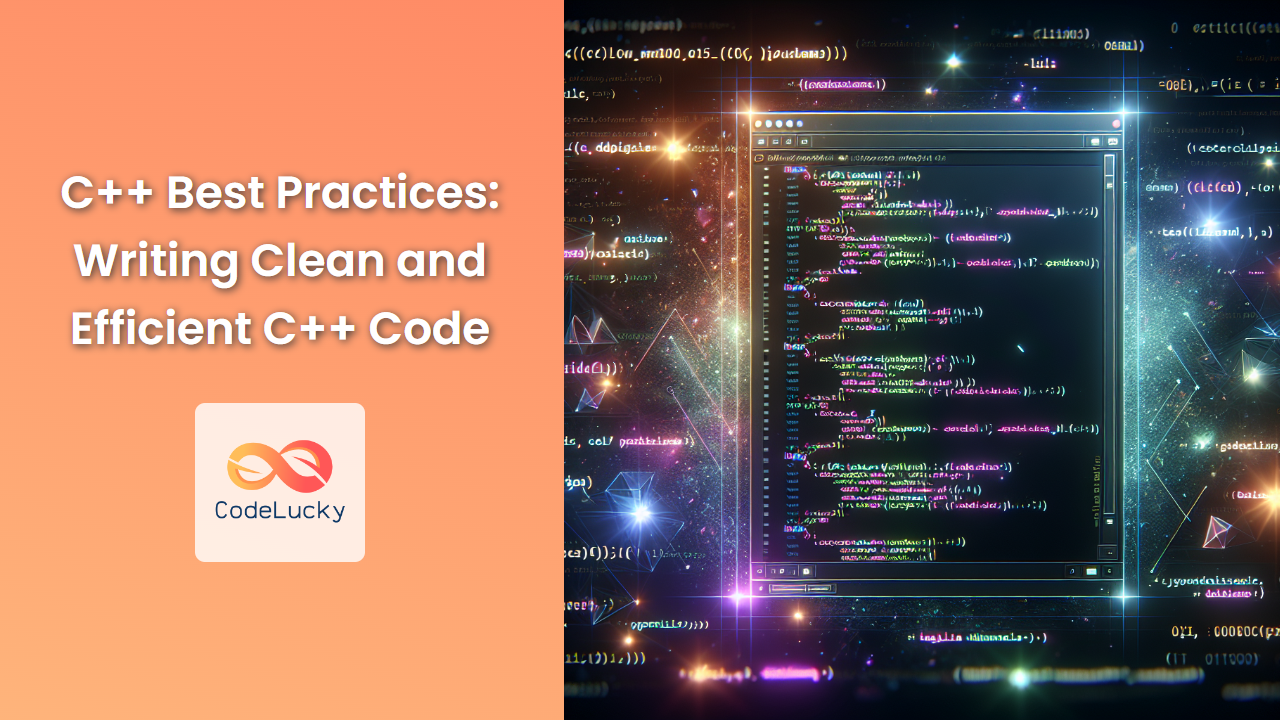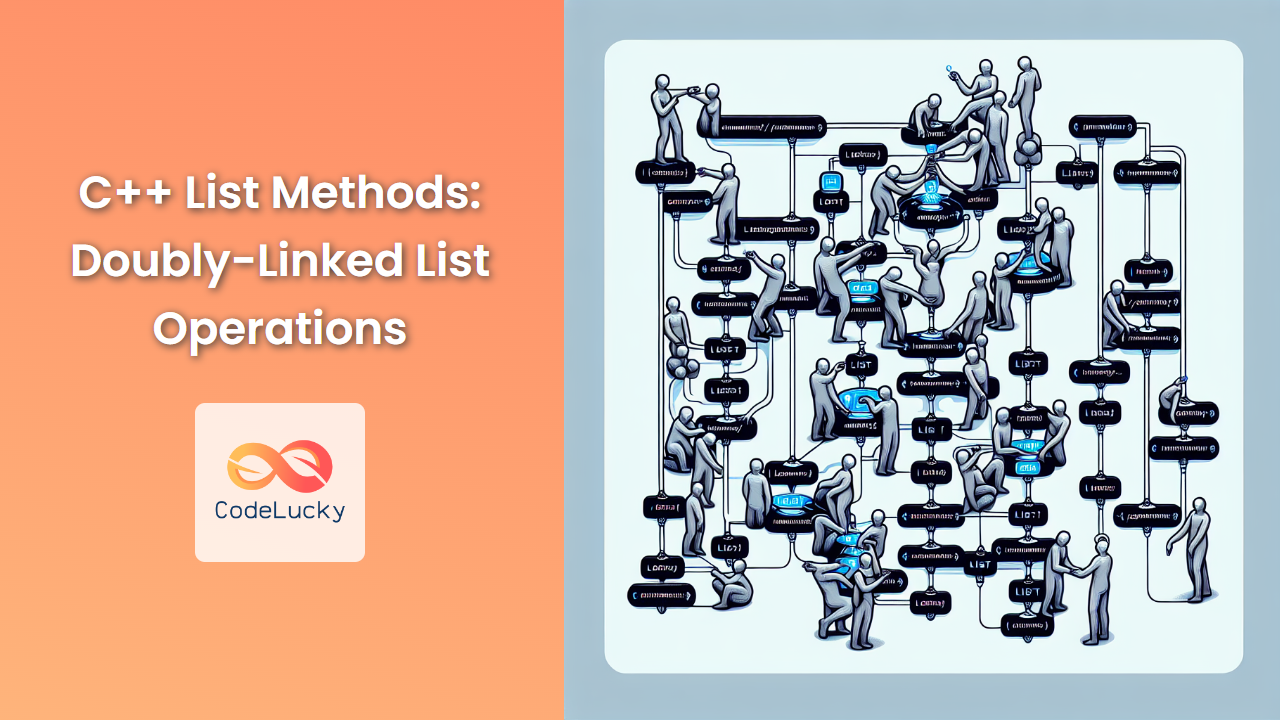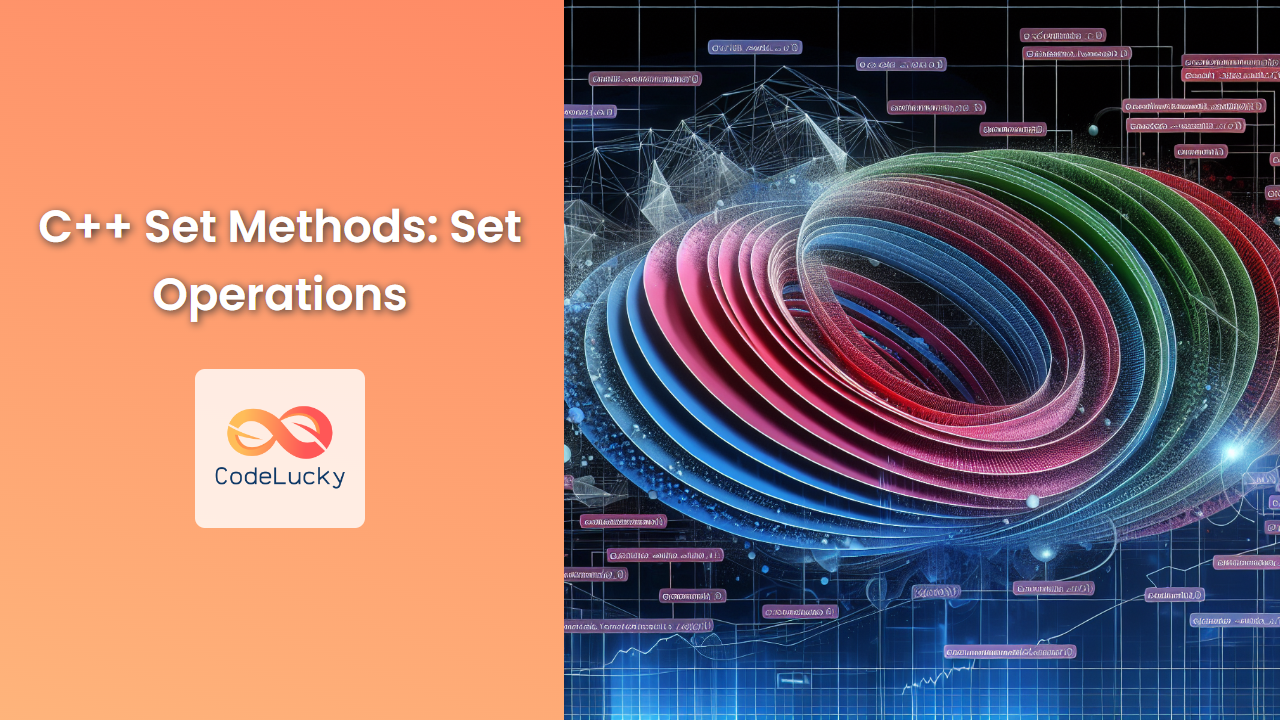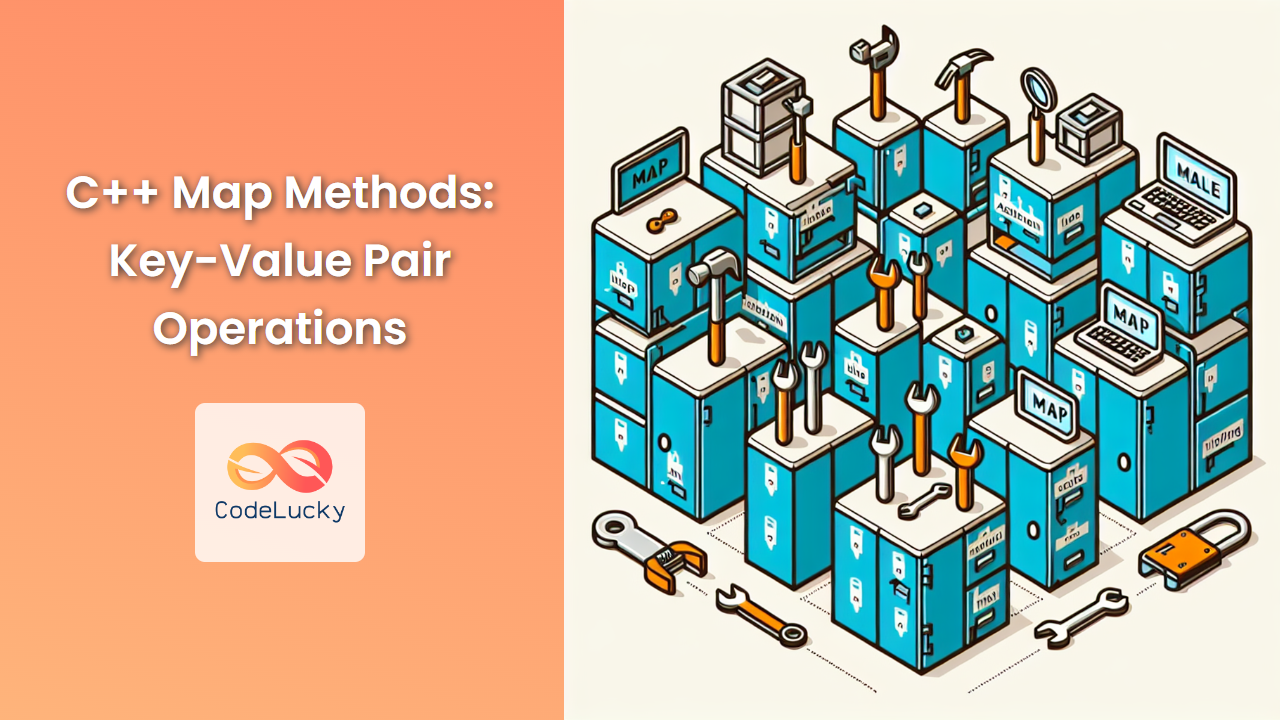C++ provides powerful stream classes for input and output operations. These classes offer a wide range of methods to manipulate data streams efficiently. In this comprehensive guide, we'll explore the most important stream methods in C++, their usage, and practical examples to help you master I/O operations.
Understanding C++ Streams
Before diving into specific methods, let's briefly review the concept of streams in C++. A stream is an abstraction that represents a device on which input and output operations are performed. C++ uses streams to handle input/output operations for console, files, and strings.
The four main stream objects in C++ are:
cin: Standard input streamcout: Standard output streamcerr: Standard error stream (unbuffered)clog: Standard error stream (buffered)
These objects are instances of istream, ostream, or iostream classes, which provide various methods for I/O operations.
Essential Stream Methods
Let's explore some of the most commonly used stream methods in C++.
1. get() and put()
The get() method reads a single character from the input stream, while put() writes a single character to the output stream.
#include <iostream>
using namespace std;
int main() {
char ch;
cout << "Enter a character: ";
ch = cin.get();
cout << "You entered: ";
cout.put(ch);
return 0;
}
📊 Input/Output:
Enter a character: A
You entered: A
2. getline()
The getline() function reads a line of text from the input stream.
#include <iostream>
#include <string>
using namespace std;
int main() {
string line;
cout << "Enter a line of text: ";
getline(cin, line);
cout << "You entered: " << line << endl;
return 0;
}
📊 Input/Output:
Enter a line of text: Hello, C++ Streams!
You entered: Hello, C++ Streams!
3. read() and write()
These methods are used for binary I/O operations. read() reads a specified number of bytes from the input stream, while write() writes a specified number of bytes to the output stream.
#include <iostream>
#include <fstream>
using namespace std;
int main() {
char buffer[10];
ofstream outFile("test.bin", ios::binary);
outFile.write("Hello", 5);
outFile.close();
ifstream inFile("test.bin", ios::binary);
inFile.read(buffer, 5);
buffer[5] = '\0';
cout << "Read from file: " << buffer << endl;
inFile.close();
return 0;
}
📊 Output:
Read from file: Hello
4. peek()
The peek() method allows you to look at the next character in the input stream without extracting it.
#include <iostream>
using namespace std;
int main() {
char ch;
cout << "Enter a character: ";
ch = cin.peek();
cout << "Next character is: " << ch << endl;
cin.get(ch);
cout << "Character read: " << ch << endl;
return 0;
}
📊 Input/Output:
Enter a character: A
Next character is: A
Character read: A
5. ignore()
The ignore() method is used to ignore or discard characters from the input stream.
#include <iostream>
#include <limits>
using namespace std;
int main() {
int num;
cout << "Enter a number: ";
cin >> num;
cin.ignore(numeric_limits<streamsize>::max(), '\n');
string line;
cout << "Enter a line of text: ";
getline(cin, line);
cout << "Number: " << num << endl;
cout << "Text: " << line << endl;
return 0;
}
📊 Input/Output:
Enter a number: 42
Enter a line of text: This is a test line
Number: 42
Text: This is a test line
6. tellg() and tellp()
These methods return the current position of the get (input) and put (output) pointers in the stream, respectively.
#include <iostream>
#include <fstream>
using namespace std;
int main() {
ofstream outFile("position.txt");
outFile << "Hello, C++!";
cout << "Current put position: " << outFile.tellp() << endl;
outFile.close();
ifstream inFile("position.txt");
inFile.seekg(0, ios::end);
cout << "File size: " << inFile.tellg() << " bytes" << endl;
inFile.close();
return 0;
}
📊 Output:
Current put position: 11
File size: 11 bytes
7. seekg() and seekp()
These methods are used to move the get (input) and put (output) pointers to a specific position in the stream.
#include <iostream>
#include <fstream>
using namespace std;
int main() {
fstream file("seek_example.txt", ios::in | ios::out | ios::trunc);
file << "ABCDEFGHIJKLMNOPQRSTUVWXYZ";
file.seekg(5, ios::beg);
char ch;
file.get(ch);
cout << "Character at position 5: " << ch << endl;
file.seekp(-5, ios::end);
file << "12345";
file.seekg(0, ios::beg);
string content;
getline(file, content);
cout << "File content: " << content << endl;
file.close();
return 0;
}
📊 Output:
Character at position 5: F
File content: ABCDEFGHIJKLMNOPQRSTUV12345
8. good(), eof(), fail(), and bad()
These methods are used to check the state of a stream.
#include <iostream>
#include <fstream>
using namespace std;
void checkStreamState(const ios& stream) {
cout << "Stream state:" << endl;
cout << "good(): " << (stream.good() ? "true" : "false") << endl;
cout << "eof(): " << (stream.eof() ? "true" : "false") << endl;
cout << "fail(): " << (stream.fail() ? "true" : "false") << endl;
cout << "bad(): " << (stream.bad() ? "true" : "false") << endl;
cout << endl;
}
int main() {
ifstream file("nonexistent.txt");
checkStreamState(file);
file.open("stream_state.txt");
file << "Test content";
checkStreamState(file);
file.close();
return 0;
}
📊 Output:
Stream state:
good(): false
eof(): false
fail(): true
bad(): false
Stream state:
good(): true
eof(): false
fail(): false
bad(): false
9. clear()
The clear() method is used to reset the error state flags of a stream.
#include <iostream>
#include <sstream>
using namespace std;
int main() {
istringstream iss("123 abc");
int num;
string str;
iss >> num >> str;
cout << "Num: " << num << ", Str: " << str << endl;
checkStreamState(iss);
iss.clear();
iss >> str;
cout << "Str: " << str << endl;
checkStreamState(iss);
return 0;
}
📊 Output:
Num: 123, Str: abc
Stream state:
good(): true
eof(): false
fail(): false
bad(): false
Str:
Stream state:
good(): false
eof(): true
fail(): false
bad(): false
10. precision() and setprecision()
These methods are used to control the precision of floating-point output.
#include <iostream>
#include <iomanip>
using namespace std;
int main() {
double pi = 3.14159265358979323846;
cout << "Default precision: " << pi << endl;
cout << "Precision 4: " << setprecision(4) << pi << endl;
cout << "Precision 10: " << setprecision(10) << pi << endl;
cout.precision(6);
cout << "Precision 6 (using precision()): " << pi << endl;
return 0;
}
📊 Output:
Default precision: 3.14159
Precision 4: 3.142
Precision 10: 3.141592654
Precision 6 (using precision()): 3.14159
Advanced Stream Techniques
Now that we've covered the essential stream methods, let's explore some advanced techniques for working with C++ streams.
1. Custom Stream Manipulators
You can create custom stream manipulators to format output in specific ways.
#include <iostream>
#include <iomanip>
using namespace std;
ostream& currency(ostream& os) {
os << "$ " << fixed << setprecision(2);
return os;
}
int main() {
double price = 19.99;
cout << "Price: " << currency << price << endl;
return 0;
}
📊 Output:
Price: $ 19.99
2. Stream Buffers
Stream buffers are low-level objects that handle the actual I/O operations. You can create custom stream buffers for specialized I/O handling.
#include <iostream>
#include <streambuf>
#include <string>
using namespace std;
class uppercase_buffer : public streambuf {
protected:
virtual int_type overflow(int_type c) {
if (c != EOF) {
c = toupper(c);
if (putchar(c) == EOF) {
return EOF;
}
}
return c;
}
};
int main() {
uppercase_buffer ubuf;
ostream out(&ubuf);
out << "Hello, Custom Stream Buffer!" << endl;
return 0;
}
📊 Output:
HELLO, CUSTOM STREAM BUFFER!
3. String Streams
String streams allow you to treat strings as streams, which can be useful for parsing and formatting operations.
#include <iostream>
#include <sstream>
#include <iomanip>
using namespace std;
int main() {
ostringstream oss;
oss << setw(10) << left << "Name" << setw(5) << right << "Age" << endl;
oss << setw(10) << left << "Alice" << setw(5) << right << 25 << endl;
oss << setw(10) << left << "Bob" << setw(5) << right << 30 << endl;
cout << "Formatted output:" << endl << oss.str();
istringstream iss("42 3.14 Hello");
int i;
double d;
string s;
iss >> i >> d >> s;
cout << "Parsed values: " << i << ", " << d << ", " << s << endl;
return 0;
}
📊 Output:
Formatted output:
Name Age
Alice 25
Bob 30
Parsed values: 42, 3.14, Hello
4. File Streams with Error Handling
When working with file streams, it's important to handle potential errors gracefully.
#include <iostream>
#include <fstream>
#include <stdexcept>
using namespace std;
void writeToFile(const string& filename, const string& content) {
ofstream file(filename);
if (!file) {
throw runtime_error("Unable to open file for writing: " + filename);
}
file << content;
if (!file) {
throw runtime_error("Error writing to file: " + filename);
}
file.close();
}
string readFromFile(const string& filename) {
ifstream file(filename);
if (!file) {
throw runtime_error("Unable to open file for reading: " + filename);
}
string content((istreambuf_iterator<char>(file)), istreambuf_iterator<char>());
if (!file) {
throw runtime_error("Error reading from file: " + filename);
}
file.close();
return content;
}
int main() {
try {
writeToFile("test.txt", "Hello, File I/O!");
string content = readFromFile("test.txt");
cout << "File content: " << content << endl;
} catch (const exception& e) {
cerr << "Error: " << e.what() << endl;
}
return 0;
}
📊 Output:
File content: Hello, File I/O!
Conclusion
C++ stream methods provide a powerful and flexible way to handle input and output operations. By mastering these methods, you can efficiently work with console I/O, file I/O, and string manipulation. The examples provided in this article demonstrate various scenarios where stream methods can be applied, from basic character input/output to advanced techniques like custom stream manipulators and error handling.
Remember that proper use of stream methods can greatly enhance the robustness and efficiency of your C++ programs. As you continue to work with C++ streams, you'll discover even more ways to leverage these powerful tools in your applications.
🔑 Key Takeaways:
- C++ streams provide a unified interface for input and output operations.
- Essential methods like
get(),put(),getline(), andignore()form the foundation of stream operations. - Advanced techniques such as custom manipulators and stream buffers offer greater control over I/O formatting.
- String streams and file streams with error handling are powerful tools for data manipulation and persistence.
By incorporating these stream methods and techniques into your C++ projects, you'll be well-equipped to handle a wide range of I/O scenarios efficiently and elegantly.

